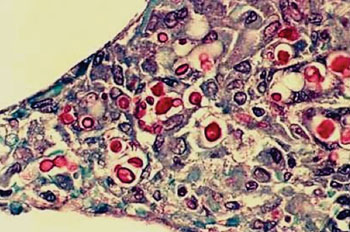Clinical Laboratory Services Introduce Diagnosis of Invasive Fungal Infections
|
By LabMedica International staff writers Posted on 08 Mar 2016 |

Image: Photomicrograph of Cryptococcus neoformans using a light India ink staining preparation. Life-threatening infections caused by the encapsulated fungal pathogen Cryptococcus neoformans have been increasing steadily over the past 10 years because of the onset of AIDS, and the expanded use of immunosuppressive drugs (Photo courtesy of CDC/Dr. Leanor Haley).

Image: Histopathology of Cryptococcus neoformans in the lung of a patient with AIDS; the inner capsule of the organism stains red (Photo courtesy of Andrew Schott).
Globally, the incidence of invasive fungal infections is more than two million per year, with mortality rates that can exceed 50% and the need for improved diagnostic tools to quickly identify invasive fungal infections is recognized worldwide.
Several factors contribute to the high mortality rate including human disease is caused by a diverse range of fungal pathogens and most current assay technologies only detect a few of the more common species and can miss the vast majority of fungal pathogens and these technologies can take several days to a week to provide results.
This problem is exacerbated by the growing numbers of patients at risk, including transplant patients and those undergoing immunosuppressive therapy or immunocompromised due to human immunodeficiency virus (HIV) infection. Immunetics, Inc. (Boston, MA, USA) a leading developer of clinical diagnostic assays, announced the launch of its new MycoDx assay for invasive fungal infections, which will be offered through its clinical reference laboratory service.
MycoDx is a multiplex molecular assay that can identify 21 fungal pathogens in a whole blood sample. Clinical samples can be tested directly with MycoDx, eliminating the prior culturing step required by many other assays. This capability reduces assay turnaround time, providing earlier results to clinicians to enable more effective treatment of life-threatening fungal infections. Such infections are particularly dangerous to immunocompromised patients including transplant recipients and those undergoing cancer therapies.
The assay results for a panel of 21 fungal targets including Candida, Aspergillus, Cryptococcus, Coccidioides, Fusarium and other species. Additional fungal targets are currently under development. Results are directly from whole blood patient samples as no blood cultures are required. Additional sample types are currently under development. There is a rapid assay turnaround time of 8 hours for all 21 targets, while most current methods can take 48 to 72 hours or more.
John Yonkin, CEO of Immunetics, said, “Our development team is currently working to transfer the assay into a user friendly microarray format for worldwide distribution. This will truly be transformational for the diagnosis of fungal disease, offering every hospital and reference laboratory access to unique technology to detect a broad range of fungal targets with same-day results.”
Related Links:
Immunetics, Inc.
Several factors contribute to the high mortality rate including human disease is caused by a diverse range of fungal pathogens and most current assay technologies only detect a few of the more common species and can miss the vast majority of fungal pathogens and these technologies can take several days to a week to provide results.
This problem is exacerbated by the growing numbers of patients at risk, including transplant patients and those undergoing immunosuppressive therapy or immunocompromised due to human immunodeficiency virus (HIV) infection. Immunetics, Inc. (Boston, MA, USA) a leading developer of clinical diagnostic assays, announced the launch of its new MycoDx assay for invasive fungal infections, which will be offered through its clinical reference laboratory service.
MycoDx is a multiplex molecular assay that can identify 21 fungal pathogens in a whole blood sample. Clinical samples can be tested directly with MycoDx, eliminating the prior culturing step required by many other assays. This capability reduces assay turnaround time, providing earlier results to clinicians to enable more effective treatment of life-threatening fungal infections. Such infections are particularly dangerous to immunocompromised patients including transplant recipients and those undergoing cancer therapies.
The assay results for a panel of 21 fungal targets including Candida, Aspergillus, Cryptococcus, Coccidioides, Fusarium and other species. Additional fungal targets are currently under development. Results are directly from whole blood patient samples as no blood cultures are required. Additional sample types are currently under development. There is a rapid assay turnaround time of 8 hours for all 21 targets, while most current methods can take 48 to 72 hours or more.
John Yonkin, CEO of Immunetics, said, “Our development team is currently working to transfer the assay into a user friendly microarray format for worldwide distribution. This will truly be transformational for the diagnosis of fungal disease, offering every hospital and reference laboratory access to unique technology to detect a broad range of fungal targets with same-day results.”
Related Links:
Immunetics, Inc.
Latest Microbiology News
- Comprehensive Review Identifies Gut Microbiome Signatures Associated With Alzheimer’s Disease
- AI-Powered Platform Enables Rapid Detection of Drug-Resistant C. Auris Pathogens
- New Test Measures How Effectively Antibiotics Kill Bacteria
- New Antimicrobial Stewardship Standards for TB Care to Optimize Diagnostics
- New UTI Diagnosis Method Delivers Antibiotic Resistance Results 24 Hours Earlier
- Breakthroughs in Microbial Analysis to Enhance Disease Prediction
- Blood-Based Diagnostic Method Could Identify Pediatric LRTIs
- Rapid Diagnostic Test Matches Gold Standard for Sepsis Detection
- Rapid POC Tuberculosis Test Provides Results Within 15 Minutes
- Rapid Assay Identifies Bloodstream Infection Pathogens Directly from Patient Samples
- Blood-Based Molecular Signatures to Enable Rapid EPTB Diagnosis
- 15-Minute Blood Test Diagnoses Life-Threatening Infections in Children
- High-Throughput Enteric Panels Detect Multiple GI Bacterial Infections from Single Stool Swab Sample
- Fast Noninvasive Bedside Test Uses Sugar Fingerprint to Detect Fungal Infections
- Rapid Sepsis Diagnostic Device to Enable Personalized Critical Care for ICU Patients
- Microfluidic Platform Assesses Neutrophil Function in Sepsis Patients
Channels
Clinical Chemistry
view channel
New PSA-Based Prognostic Model Improves Prostate Cancer Risk Assessment
Prostate cancer is the second-leading cause of cancer death among American men, and about one in eight will be diagnosed in their lifetime. Screening relies on blood levels of prostate-specific antigen... Read more
Extracellular Vesicles Linked to Heart Failure Risk in CKD Patients
Chronic kidney disease (CKD) affects more than 1 in 7 Americans and is strongly associated with cardiovascular complications, which account for more than half of deaths among people with CKD.... Read moreMolecular Diagnostics
view channel
Diagnostic Device Predicts Treatment Response for Brain Tumors Via Blood Test
Glioblastoma is one of the deadliest forms of brain cancer, largely because doctors have no reliable way to determine whether treatments are working in real time. Assessing therapeutic response currently... Read more
Blood Test Detects Early-Stage Cancers by Measuring Epigenetic Instability
Early-stage cancers are notoriously difficult to detect because molecular changes are subtle and often missed by existing screening tools. Many liquid biopsies rely on measuring absolute DNA methylation... Read more
“Lab-On-A-Disc” Device Paves Way for More Automated Liquid Biopsies
Extracellular vesicles (EVs) are tiny particles released by cells into the bloodstream that carry molecular information about a cell’s condition, including whether it is cancerous. However, EVs are highly... Read more
Blood Test Identifies Inflammatory Breast Cancer Patients at Increased Risk of Brain Metastasis
Brain metastasis is a frequent and devastating complication in patients with inflammatory breast cancer, an aggressive subtype with limited treatment options. Despite its high incidence, the biological... Read moreHematology
view channel
New Guidelines Aim to Improve AL Amyloidosis Diagnosis
Light chain (AL) amyloidosis is a rare, life-threatening bone marrow disorder in which abnormal amyloid proteins accumulate in organs. Approximately 3,260 people in the United States are diagnosed... Read more
Fast and Easy Test Could Revolutionize Blood Transfusions
Blood transfusions are a cornerstone of modern medicine, yet red blood cells can deteriorate quietly while sitting in cold storage for weeks. Although blood units have a fixed expiration date, cells from... Read more
Automated Hemostasis System Helps Labs of All Sizes Optimize Workflow
High-volume hemostasis sections must sustain rapid turnaround while managing reruns and reflex testing. Manual tube handling and preanalytical checks can strain staff time and increase opportunities for error.... Read more
High-Sensitivity Blood Test Improves Assessment of Clotting Risk in Heart Disease Patients
Blood clotting is essential for preventing bleeding, but even small imbalances can lead to serious conditions such as thrombosis or dangerous hemorrhage. In cardiovascular disease, clinicians often struggle... Read moreImmunology
view channelBlood Test Identifies Lung Cancer Patients Who Can Benefit from Immunotherapy Drug
Small cell lung cancer (SCLC) is an aggressive disease with limited treatment options, and even newly approved immunotherapies do not benefit all patients. While immunotherapy can extend survival for some,... Read more
Whole-Genome Sequencing Approach Identifies Cancer Patients Benefitting From PARP-Inhibitor Treatment
Targeted cancer therapies such as PARP inhibitors can be highly effective, but only for patients whose tumors carry specific DNA repair defects. Identifying these patients accurately remains challenging,... Read more
Ultrasensitive Liquid Biopsy Demonstrates Efficacy in Predicting Immunotherapy Response
Immunotherapy has transformed cancer treatment, but only a small proportion of patients experience lasting benefit, with response rates often remaining between 10% and 20%. Clinicians currently lack reliable... Read morePathology
view channel
Engineered Yeast Cells Enable Rapid Testing of Cancer Immunotherapy
Developing new cancer immunotherapies is a slow, costly, and high-risk process, particularly for CAR T cell treatments that must precisely recognize cancer-specific antigens. Small differences in tumor... Read more
First-Of-Its-Kind Test Identifies Autism Risk at Birth
Autism spectrum disorder is treatable, and extensive research shows that early intervention can significantly improve cognitive, social, and behavioral outcomes. Yet in the United States, the average age... Read moreTechnology
view channel
Robotic Technology Unveiled for Automated Diagnostic Blood Draws
Routine diagnostic blood collection is a high‑volume task that can strain staffing and introduce human‑dependent variability, with downstream implications for sample quality and patient experience.... Read more
ADLM Launches First-of-Its-Kind Data Science Program for Laboratory Medicine Professionals
Clinical laboratories generate billions of test results each year, creating a treasure trove of data with the potential to support more personalized testing, improve operational efficiency, and enhance patient care.... Read moreAptamer Biosensor Technology to Transform Virus Detection
Rapid and reliable virus detection is essential for controlling outbreaks, from seasonal influenza to global pandemics such as COVID-19. Conventional diagnostic methods, including cell culture, antigen... Read more
AI Models Could Predict Pre-Eclampsia and Anemia Earlier Using Routine Blood Tests
Pre-eclampsia and anemia are major contributors to maternal and child mortality worldwide, together accounting for more than half a million deaths each year and leaving millions with long-term health complications.... Read moreIndustry
view channelNew Collaboration Brings Automated Mass Spectrometry to Routine Laboratory Testing
Mass spectrometry is a powerful analytical technique that identifies and quantifies molecules based on their mass and electrical charge. Its high selectivity, sensitivity, and accuracy make it indispensable... Read more
AI-Powered Cervical Cancer Test Set for Major Rollout in Latin America
Noul Co., a Korean company specializing in AI-based blood and cancer diagnostics, announced it will supply its intelligence (AI)-based miLab CER cervical cancer diagnostic solution to Mexico under a multi‑year... Read more
Diasorin and Fisher Scientific Enter into US Distribution Agreement for Molecular POC Platform
Diasorin (Saluggia, Italy) has entered into an exclusive distribution agreement with Fisher Scientific, part of Thermo Fisher Scientific (Waltham, MA, USA), for the LIAISON NES molecular point-of-care... Read more















